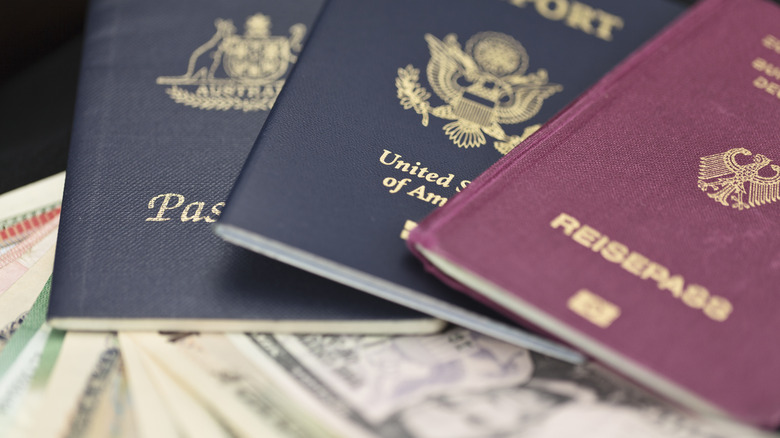Countries Where You Can Legally Purchase A Second Passport
Don't you love that scene in spy thrillers when the hero goes to his secret stash and pulls out a wad of currency and a bundle of passports, ready to make his next move? Well, we're here to tell you that you don't need to be James Bond or Jason Bourne to make it a reality. You just need the wad of cash, and you're on your own for that part. But if you have the means, there are a number of countries around the world where you can legally buy another passport.
Why would you want a second passport, some people may ask? You don't need to be a secret agent for this; there are many legitimate and practical reasons why another nationality can be advantageous. If you travel and work regularly between your home nation and another country, citizenship in the second helps make travel easier and removes the need for visas and work permits. Buying abroad is en vogue and investors considering setting up businesses or purchasing property offshore can do so without worrying about restrictions on foreign ownership. Dual citizenship also provides access to medical care abroad, education, and other social services that might not otherwise be available to a foreign national. There are drawbacks, too — dual nationality means you are privy to the laws of both nations which can have repercussions back home, and tax issues can become complicated. Overall, however, the many benefits far outweigh the negatives.
Which countries sell passports and why?
Why do countries sell citizenships? The main reason is simple: money. By selling passports to foreign nationals, a country is able to raise extra cash for the coffers. Buying such a document is a significant outlay for most travelers and can cost millions of dollars. Once the person has bought the passport, their investment in the country most likely won't stop there. Other financial commitments such as the purchase of real estate or business ventures may also follow, further contributing to the nation's economy. In cases like this, some nations will offer Citizenship by Investment, while many more have Residence by Investment programs. It's a subtle but important difference. Residency will give you many of the benefits that locals enjoy, but you won't have dual nationality unless you obtain citizenship.
For the Citizenship by Investment, you have a range of options around the world. Vanuatu, in the South Pacific, boasts some of the best beaches in the world and offers citizenship for a contribution of $130,000 while Cambodia charges $245,000. Closer to the United States, Antigua and Barbuda, Dominica, St. Lucia, and St. Kitts and Nevis all welcome investors to the Caribbean islands for between $200,000 and $250,000. If you want to get established in Europe, the price goes up substantially. An investment program in Turkey will set you back $400,000; Malta around $600,000; and Austria a hefty $2.1 million. A full list of countries participating in this scheme as of October 2024 can be found here.
What are the requirements for Citizenship by Investment?
Applying for Citizenship by Investment requires plenty of paperwork and patience as there is a range of criteria that must be considered before a country's government will rubber stamp the deal. While the initiative is designed to help bolster the country's finances, it is still necessary to ensure that only upstanding individuals who will benefit society as well as the economy receive citizenship. However, suitable candidates with the desired amount of capital will be fast-tracked past the usual minimum temporary residence period and receive naturalization immediately after a successful application is complete. Once you have your dual citizenship, the next step is securing your second passport.
Generally, factors taken into consideration include: age (over 18s only); no criminal record; a clean bill of health; no affiliation with prohibited countries; an excellent record of employment; and a commitment to leaving your money in the country for a minimum period of time. The application can be a lengthy process ranging from a minimum of two months in North Macedonia all the way up to three years in Austria. Needless to say, with the amount of time, effort, and cost involved, Citizenship by Investment isn't something you should enter into lightly. However, if it is something that would benefit you, your family, and your business prospects, it is worth contacting a licensed agent or advisor to help you through the process.


